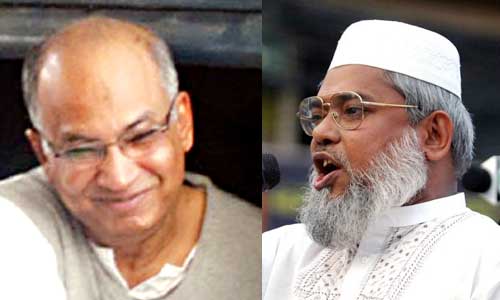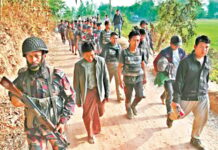The Appellate Division of the Supreme Court is likely to hear on Tuesday review petitions of condemned war crimes convicts Ali Ahsan Muhammad Mojaheed and Salauddin Quader Chowdhury against its verdicts upholding their death penalties for crimes against humanity during the Liberation War in 1971. Earlier, on November 2, the four-member Appellate Division bench, headed by Chief Justice Surendra Kumar Sinha, fixed November 17 for the hearing on review petitions of the two condemned war crimes convicts. Besides, the bench turned down a plea filed by the BNP leader for taking testimony of several people in connection with the offenses he was convicted of by the International Crimes Tribunal. On October 20, SC Chamber Judge Justice Syed Mahmud Hossain fixed November 2 for the hearing on the review petitions of Jamaat leader Ali Ahsan Muhammad Mojaheed and BNP leader Salauddin Quader Chowdhury, reports United News of Bangladesh. Mojaheed and Salauddin filed the review petitions with the SC against its verdicts that upheld their death penalties for crimes against humanity during the 1971 war on October 14. The SC on September 30 released the full verdicts awarding death penalty to them for their crimes against humanity during the war, clearing the way for the execution of the judgments. The court on June 16 upheld the death sentence awarded by the ICT-2 to Mojaheed for killing intellectuals during the war. The International Crimes Tribunal-2 on July 17, 2013 awarded Ali Ahsan Muhammad Mojaheed death penalty for committing crimes against humanity during the Liberation War in collaboration with the Pakistan occupation forces, after finding the Al Badr boss guilty of five, out of seven, charges. On August 11, 2013, condemned convict Mojaheed filed an appeal with the Appellate Division against his capital punishment awarded by the ICT-2. Mojaheed was arrested on charge of hurting religious sentiment on June 29, 2010 and later he was shown arrested in a case filed for committing crimes against humanity on August 2 that year. On July 29, the Supreme Court upheld the verdict of the then International Crimes Tribunal-1 (ICT-1) that had condemned BNP leader Salauddin Quader Chowdhury to death for committing crimes against humanity, including rape and mass killing during the Liberation War 43 years ago. On October 1, 2013, the then International Crimes Tribunal-1 found the BNP leader guilty of crimes against humanity during the war of liberation and condemned him to death. On October 29 of the same year, Salauddin Quader Chowdhury filed an appeal with the Appellate Division of the Supreme Court against the
Sorce: New Age











Salahuddin was not in the country during that time. This is a mockery of justice. International crimes tribunal is a political machine concocted by AL and Sheikh Hasina with the help Indian intelligence.
Pakistan army was not occupatioal force in East Bengal in 1971.It was a constitutional country member of UNO.Infact it was india who attack and invaded and changed its name toBD
I totally agree with Manzur Haque above.It was not a war of liberation it was an Insurgency with the help of Indian Intelligence
no country recognised Bangladesh except india and soviets.it was only when pak recogniesed the the world started ut acceppting it